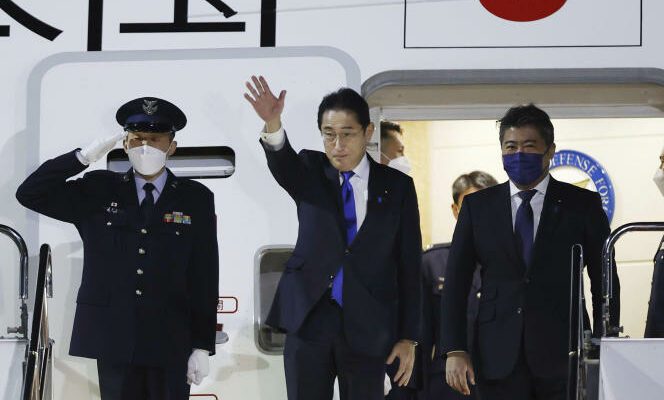As every year, at the end of December, an emblematic ideogram of the past year is calligraphed with great pomp in the enclosure of the temple of Kiyomizu, in Kyoto, by the superior: for 2022, that ofikusa (old word meaning “conflict, war”). This choice reflects the latent anxiety that prevails in Japan following the invasion of Ukraine by Russia and the aggravation of the confrontation between China and the United States. The diplomatic tour of the Prime Minister, Fumio Kishida, which began in Paris on Monday January 9, before continuing in Rome, London, Ottawa and Washington, is part of this context of tensions which led the Archipelago to adopt, the December 16, 2022, a new defense doctrine.
That “national security strategy” provides for a drastic reinforcement of Japan’s defense capabilities. Capped since 1976 at 1% of gross domestic product (GDP), the symbolic threshold of a purely defensive policy, military spending must rise to 2% of GDP in 2027. Over the next five years, Tokyo will devote an amount of of 43,000 billion yen (300 billion euros). The country, until now a medium military power, intends to acquire counter-attack capabilities in order to be able to strike at sites representing a potential threat and to strengthen operational coordination with its American ally.
Geostrategic shift
Japan had accustomed the world to a gradual evolution of its defense doctrine, through reinterpretations of its constitutional pacifism. This time, he has crossed a new threshold, emptying a little more of its meaning the provisions of article 9 of the Constitution, by which he renounces war. This geostrategic shift would have caused an outcry in public opinion a few years ago. But at this pivotal moment in the history of post-war Japan, the debate concerns the means of financing this defensive effort and not the other national interests of the Archipelago (economic, diplomatic), notes the newspaper. Nikkei Asia.
Two formulas hit home in a society already worried about China’s shows of force around Japan. “What happens in Ukraine can happen in Northeast Asia,” has said Prime Minister Kishida, implying that this invasion could set a precedent encouraging China to attack Taiwan. Given the proximity of the Okinawa archipelago, where the bulk of the American contingent is stationed, the country would be involved in the conflict.. “If Japan is attacked, who will defend it? », added the former Deputy Prime Minister, Taro Aso, a figure on the right who, for decades, has been campaigning for Japan to once again become a “normal country”with all the attributes of sovereignty, including substantial military power.
You have 63.78% of this article left to read. The following is for subscribers only.
